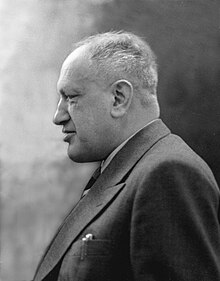Leopold Infeld
Leopold Infeld | |
|---|---|
 Leopold Infeld in 1960 | |
| Born | 20 August 1898 |
| Died | 15 January 1968 (aged 69) |
| Citizenship | Austrian (1898–1918) Polish (1918–1968) Canadian (1939–50) |
| Alma mater | Jagiellonian University |
| Known for | Born–Infeld theory Einstein–Infeld–Hoffmann equations Infeld–Hull factorization method |
| Scientific career | |
| Fields | Physics |
| Institutions | Cambridge University Jagiellonian University University of Lwów Princeton University University of Toronto |
| Doctoral students | Alfred Schild Andrzej Trautman P. R. Wallace |
Leopold Infeld (20 August 1898 – 15 January 1968) was a Polish physicist who worked mainly in Poland and Canada (1938–1950). He was a Rockefeller fellow at Cambridge University (1933–1934) and a member of the Polish Academy of Sciences.[1]
Early life
Infeld was born in a family of Polish Jews, in Kraków which at that time was located in the Austro-Hungarian Empire, to rejoin independent Poland in 1918. He studied physics at the Jagiellonian University and since 1920 in Berlin, where he engaged the help of Albert Einstein[2] to gain admission to the University. He obtained his doctorate in 1921. In 1933 he left for England, then USA and Canada after the death of his first wife, Halina.
Work

Infeld was interested in the theory of relativity. He was awarded a doctorate at the Jagiellonian University (1921), worked as an assistant and a docent at the University of Lwów (1930–1933) and then as a professor at the University of Toronto between 1939 and 1950. He collaborated with Albert Einstein at Princeton University (1936–1938). The two scientists co-formulated the equation describing star movements as well as co-wrote a popular science book The Evolution of Physics. In addition to its contribution to physics as a discipline, this book presents an outstanding reflection on the power of ideas and imagination in scientific inquiry.[3]
After the first use of nuclear weapons in 1945 Infeld, like Einstein, became a peace activist. Because of his activities, he was unjustly accused of having communist sympathies. In 1950 he left Canada and returned to communist Poland. He felt he had an obligation to help science in Poland recover from the ravages of the Second World War. In the strongly anti-communist climate of the time many in the Canadian government and media feared that, working in a communist country, he would betray nuclear weapons secrets. He was stripped of his Canadian citizenship and was widely denounced as a traitor. In actuality, Infeld's field was the theory of relativity—not directly linked to nuclear weapons research. After Infeld's return to Poland, he requested a leave of absence from the University of Toronto. His request was denied and Infeld resigned his post. In 1995 the University of Toronto made amends and granted Infeld the posthumous title of professor emeritus. Upon his return to Poland, Infeld became a professor at the University of Warsaw, a post he held until his death.
The Born–Infeld model was named after Max Born and Leopold Infeld, who first proposed it. The Infeld-Hull Factorization Method describing general sets of solutions to the Schrödinger equation.
Infeld was one of the 11 signatories to the Russell–Einstein Manifesto in 1955, and is the only signatory never to receive a Nobel Prize.
Infeld is the author of Quest: An Autobiography and the biography Whom the Gods Love: The Story of Évariste Galois.
In 1939 he married Helen Schlauch, an American mathematician.
Publications
- Infeld, L.; Hull, T. E. (1953). "Factorization Method". Rev Mod Phys. 23: 21. Bibcode:1951RvMP...23...21I. doi:10.1103/RevModPhys.23.21.
- Infeld, Leopold (2006). Quest: An Autobiography (Reprint ed.). American Mathematical Society. ISBN 0-8218-4073-8. (originally published in 1965)
References
- ^ Bergmann, Peter G. (March 1968). "Obituary: Leopold Infeld, Authority on Field Theory and Relativity". Physics Today. 21 (3): 113. Bibcode:1968PhT....21c.113B. doi:10.1063/1.3034808.
- ^ Current Biography. H.W. Wilson Company. 1941.
- ^ Albert Einstein on the power of ideas and imagination in science
Further reading
- Trautman, Andrzej (1970–1980). "Infeld, Leopold". Dictionary of Scientific Biography. Vol. 7. New York: Charles Scribner's Sons. pp. 10–11. ISBN 978-0-684-10114-9.
- O'Connor, John J.; Robertson, Edmund F., "Leopold Infeld", MacTutor History of Mathematics Archive, University of St Andrews
- Leopold Infeld at the Mathematics Genealogy Project
External links
![]() Quotations related to Leopold Infeld at Wikiquote
Quotations related to Leopold Infeld at Wikiquote
- Use dmy dates from October 2011
- 1898 births
- 1968 deaths
- Polish Jews
- Jews from Galicia (Eastern Europe)
- Jagiellonian University alumni
- Academics of the University of Cambridge
- Princeton University faculty
- Members of the Polish Academy of Sciences
- Polish physicists
- Relativity theorists
- University of Toronto faculty
- University of Warsaw faculty
- 20th-century Jews
- Jewish physicists
